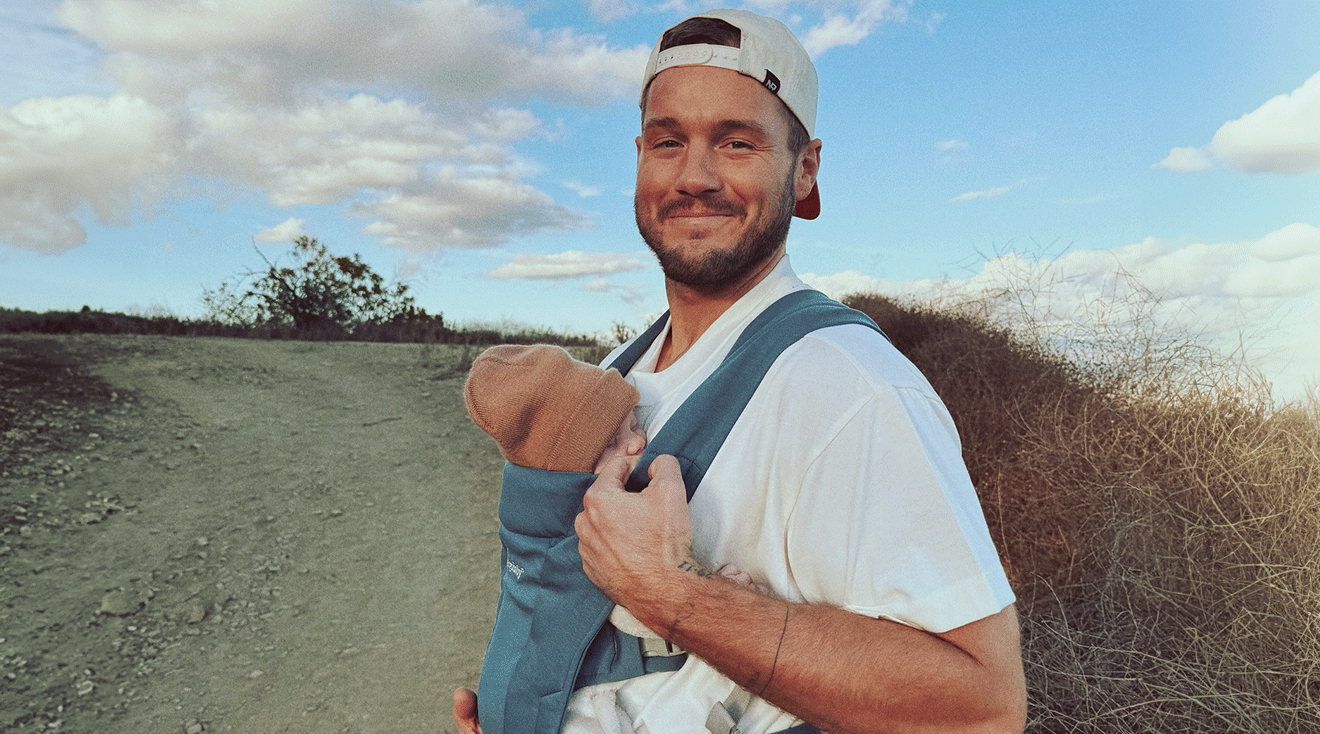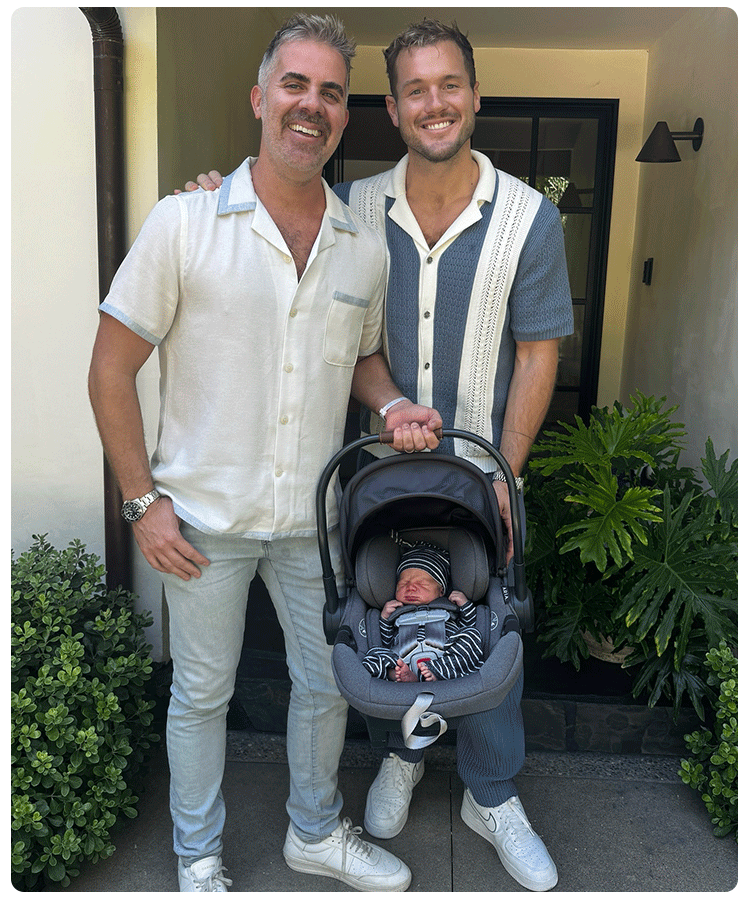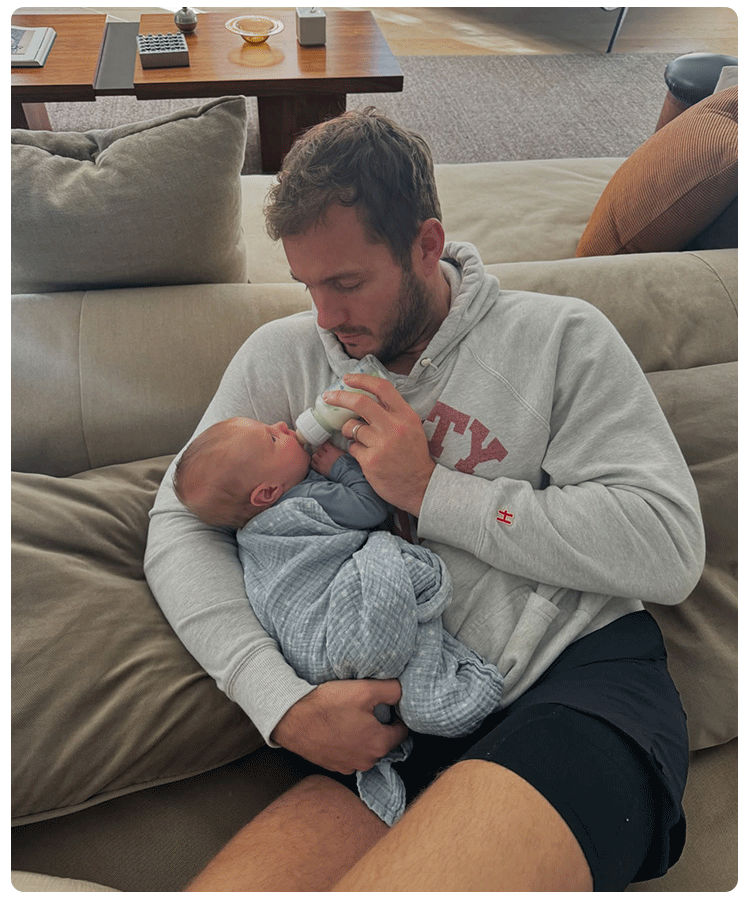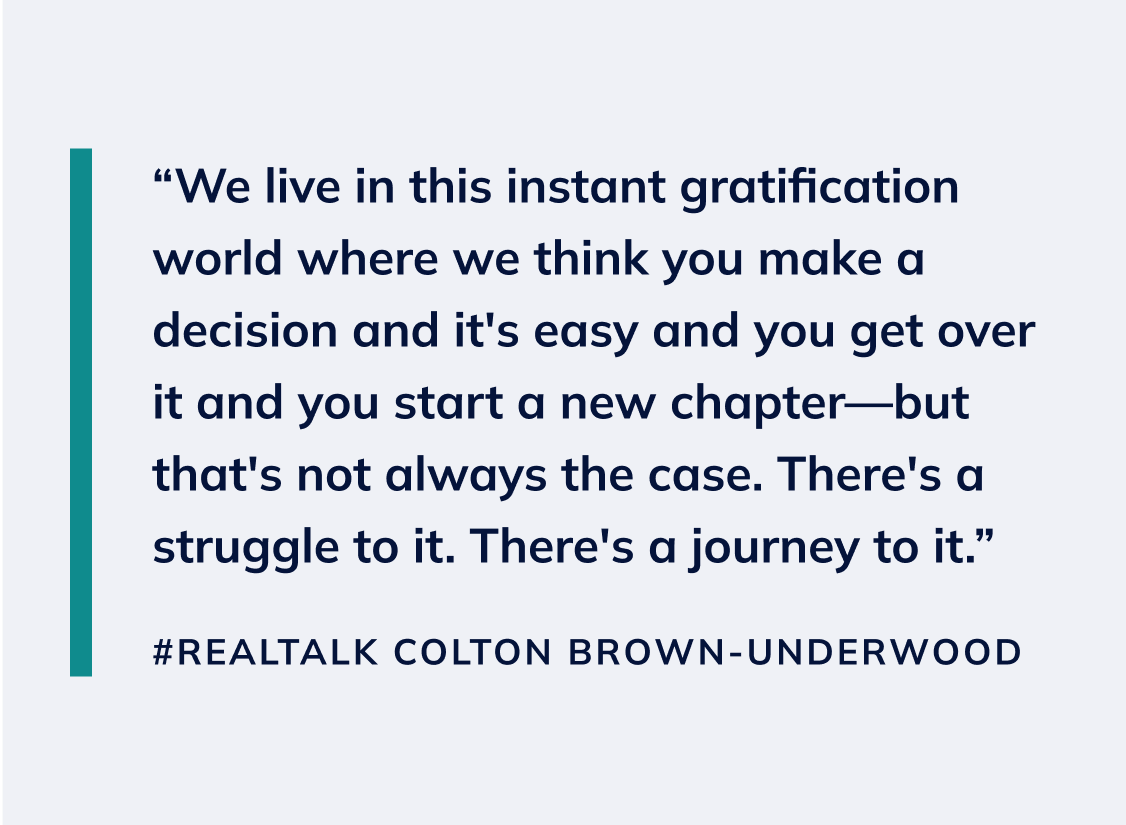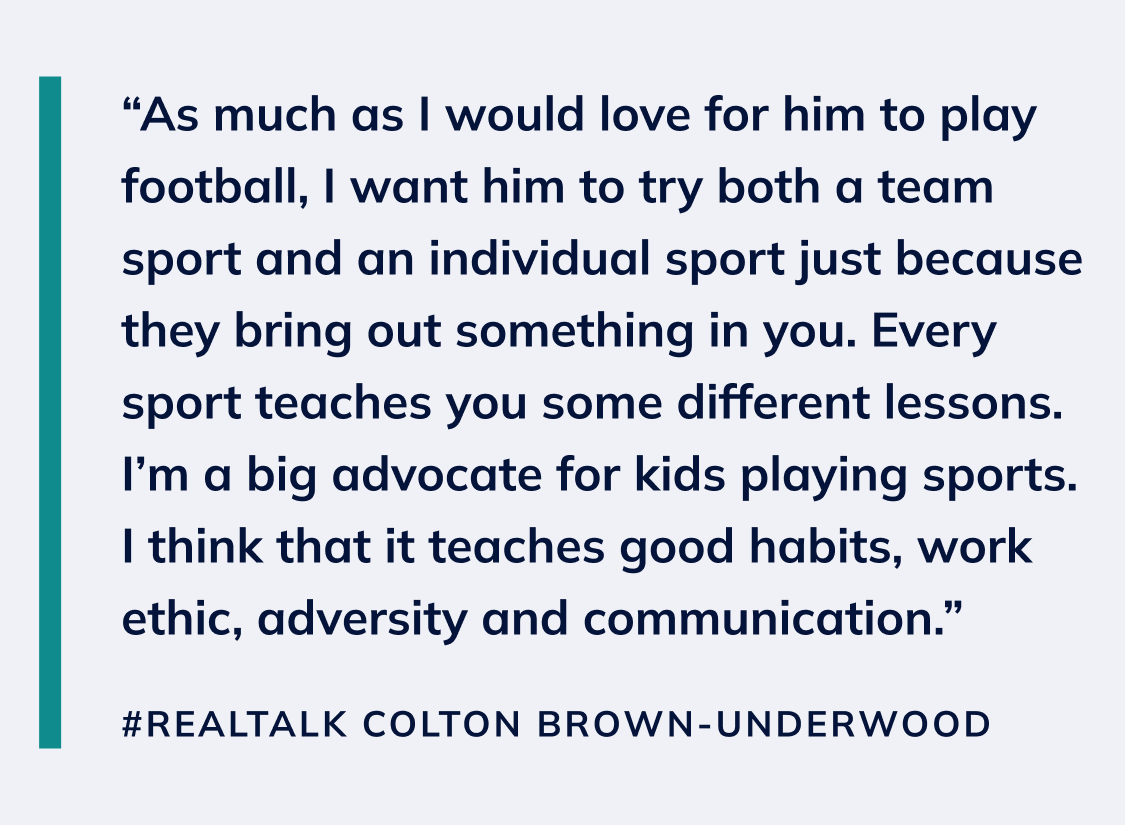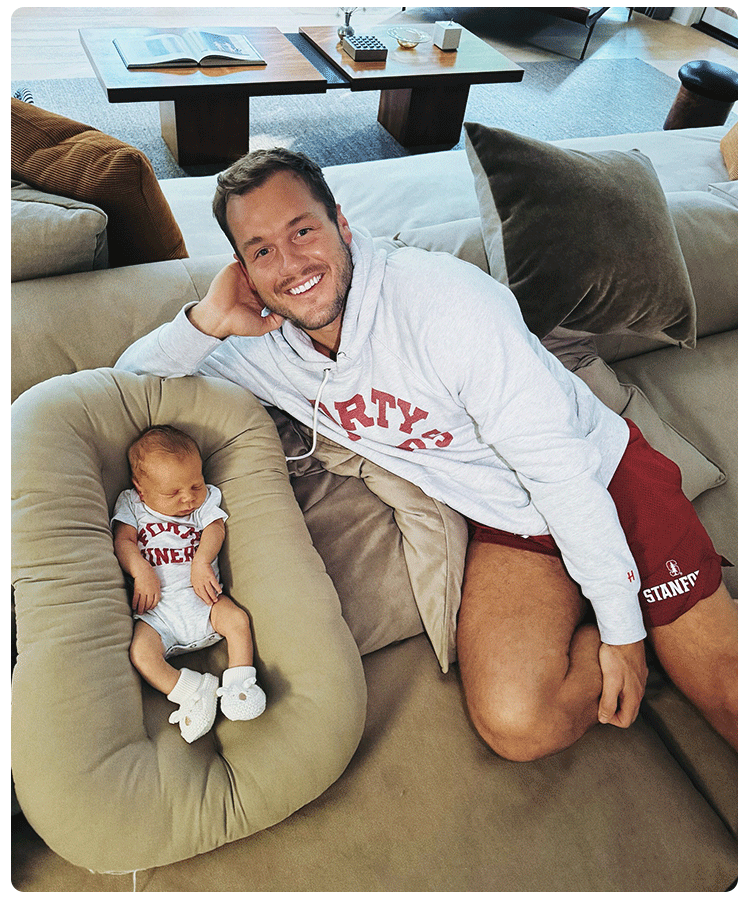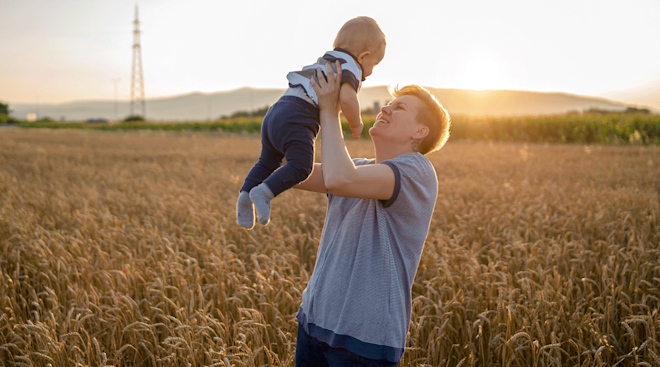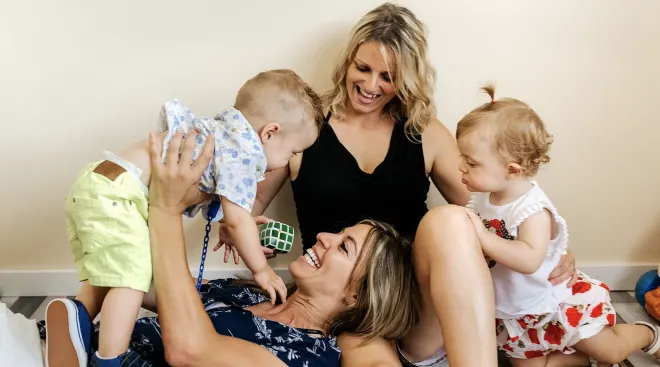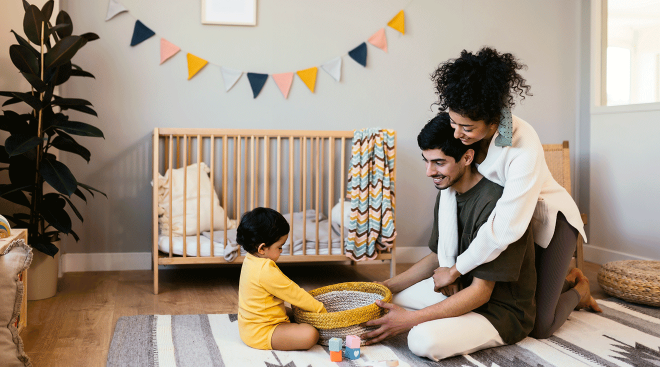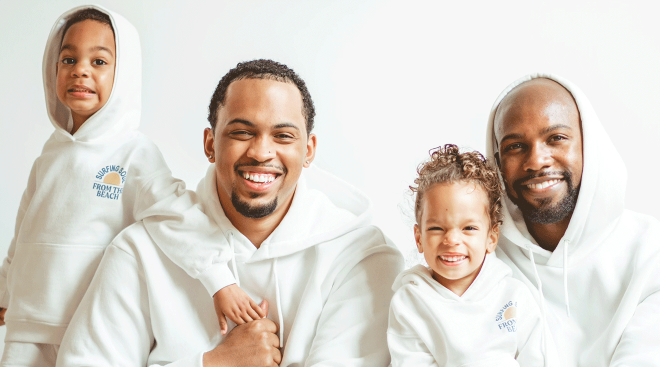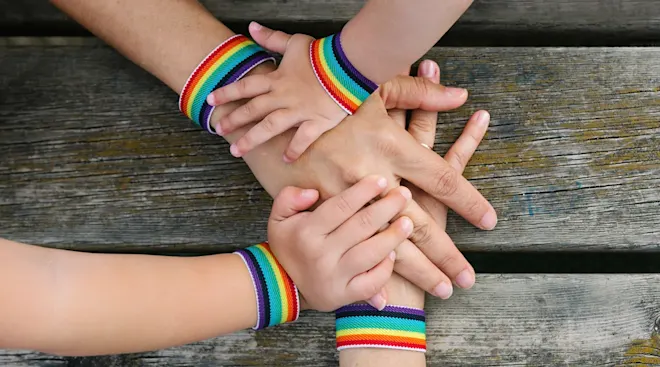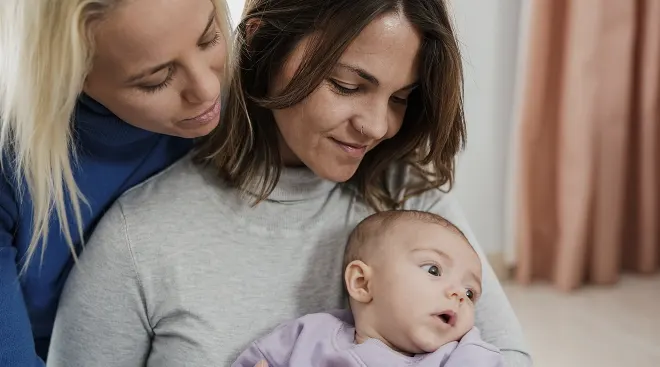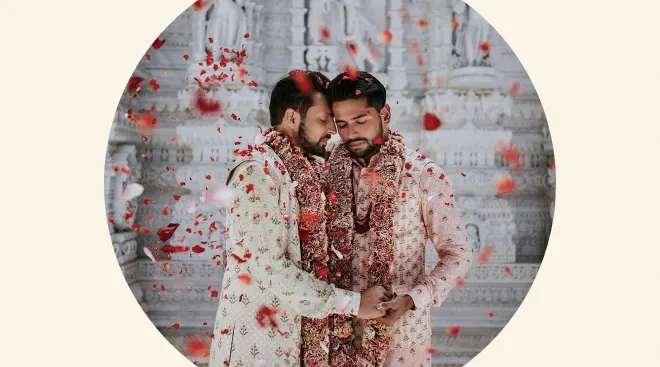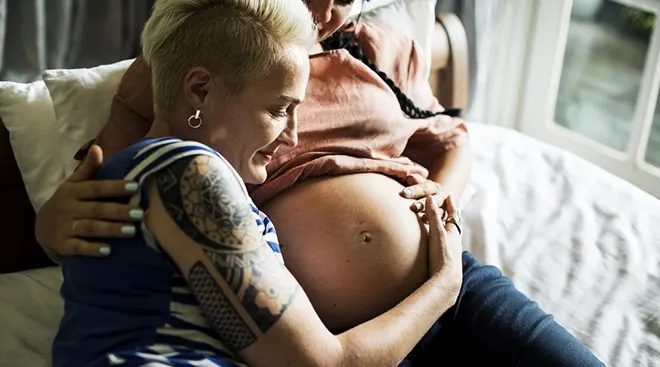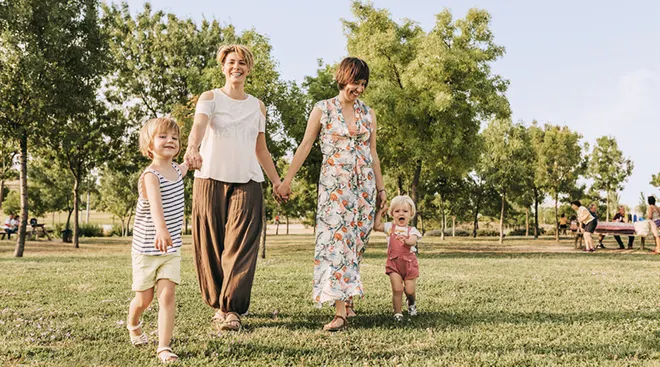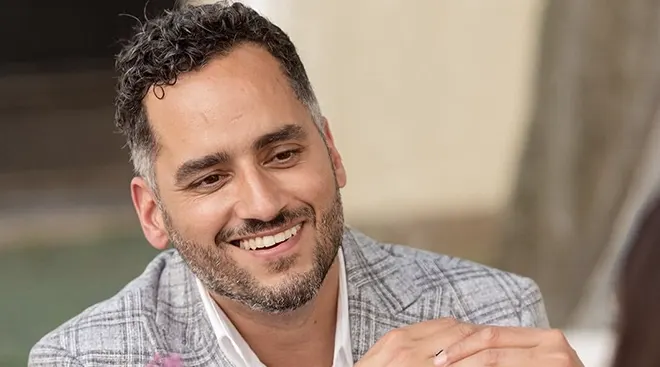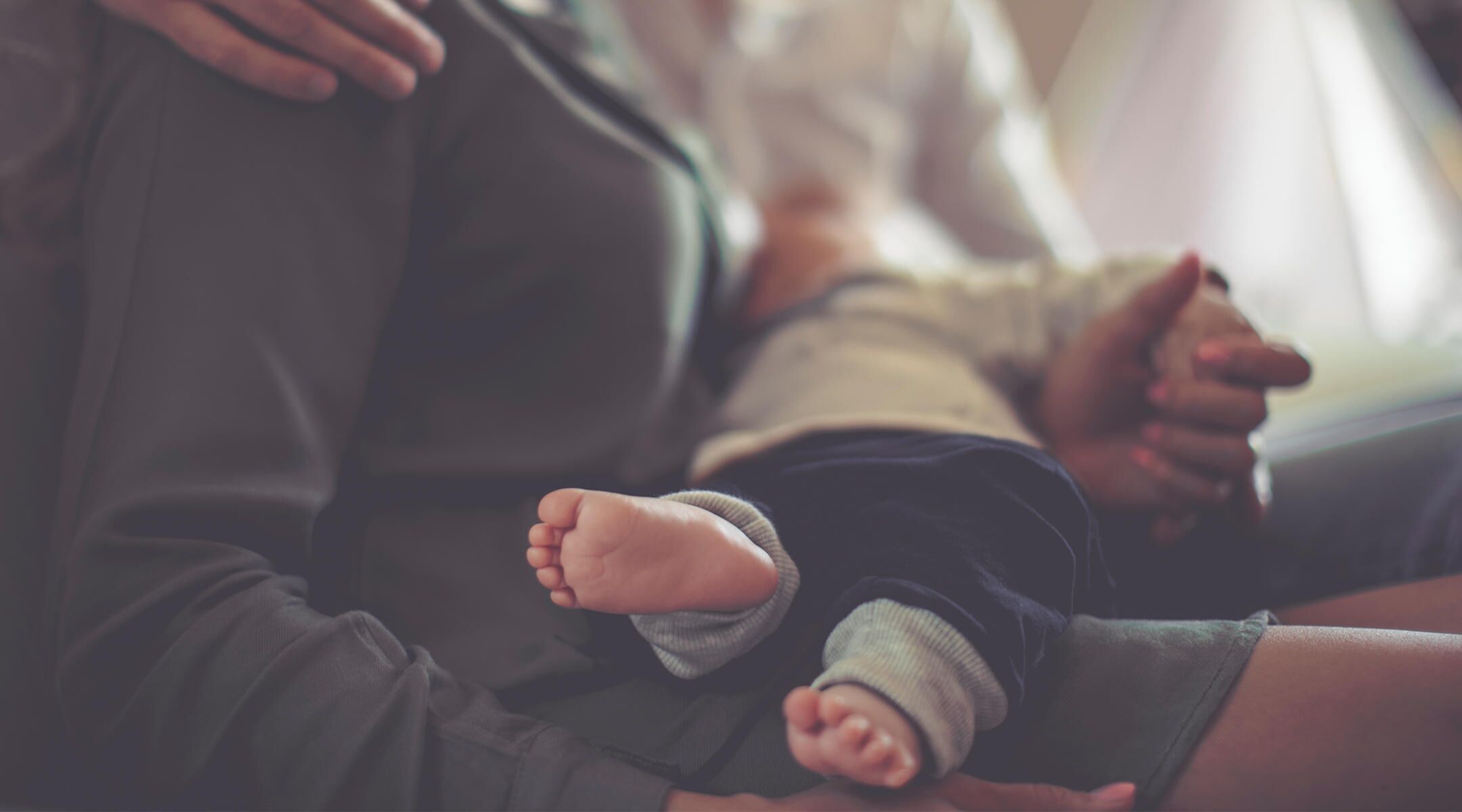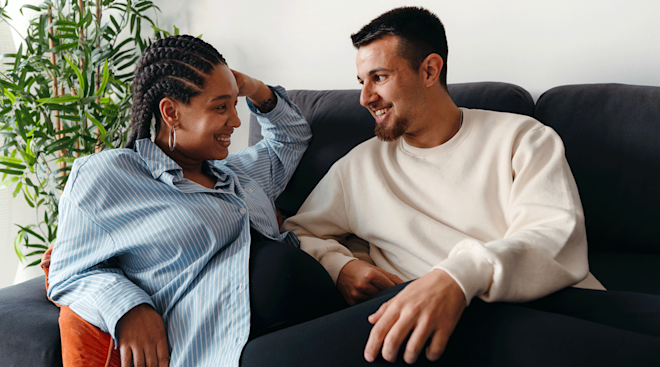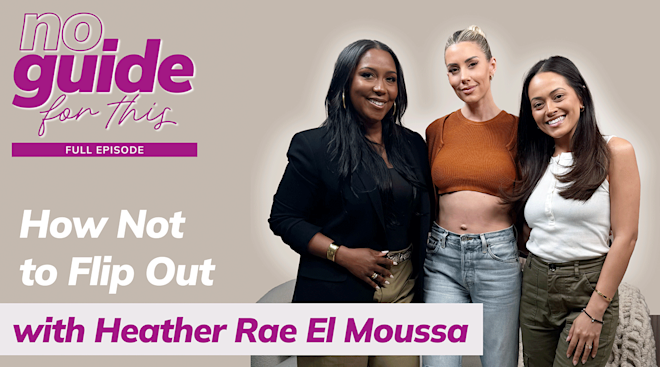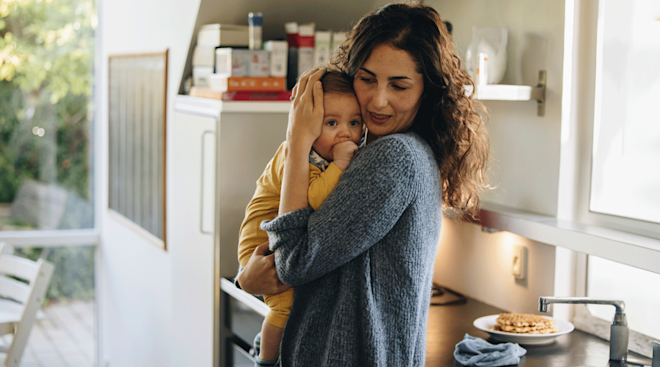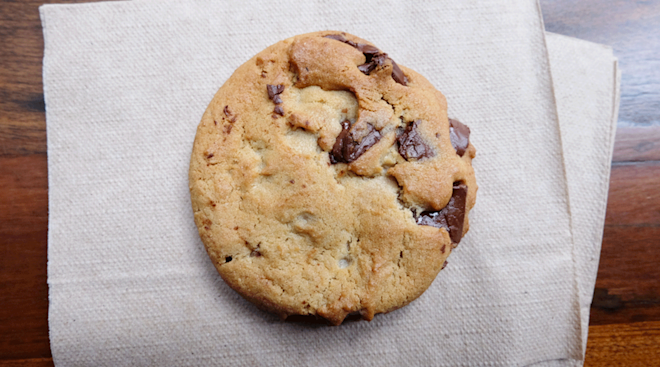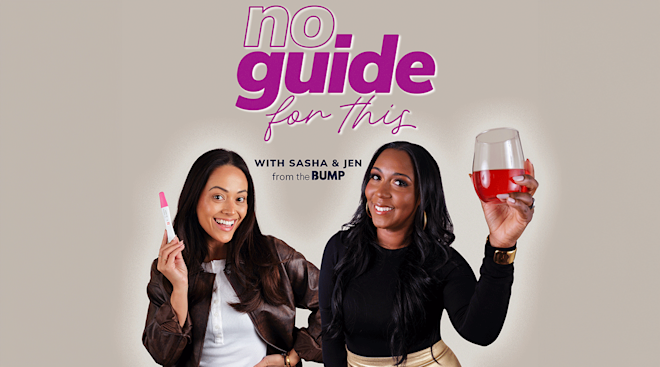Colton Brown-Underwood on Mental Heath and Life With a Newborn
You know Colton Brown-Underwood as a former professional football player and Bachelor universe alumnus. He also hosts the podcast Daddyhood, where he details his journey to becoming a parent with his husband Jordan C. Brown. In September 2024, the couple welcomed their first child, a son named Bishop Colton Brown-Underwood, via surrogate. The Bump sat down with Colton (with a surprise guest appearance from Baby Bishop!) to chat about his path, how he’s adjusting to life as a dad and his advocacy for mental health among collegiate athletes.
The Bump: Congratulations on Baby Bishop! How are you and Jordan adjusting?
Colton Brown-Underwood: Honestly, it’s the biggest blessing of our lives. Every day we’re more and more grateful for the doctors, the nurses, our donor, our surrogate—all of the people who played a role in our fertility journey. We feel like we can never pay that debt back. It’s an overwhelming amount of love that we have for a human being. People used to talk about it and say, “Until you have a kid, you never know”—and that’s a hundred percent accurate. You can never fathom the amount of love until you have your own little nugget and family member.
TB: As you’re getting into the swing of new parenthood, has there been anything that surprised you?
CBU: I was a little nervous for the newborn phase just because I’m a big guy. I’m still a little clumsy, and I was really nervous about dropping him. My hand was bigger than his entire body when he was first born. There were moments that I had leading up to his birth where I was like, “Am I really ready for this?” And then he came and something kicked in—my instincts just were there. I was swaddling him, changing his diaper or holding his legs up with one hand. It really shocked and surprised me how good I was—a natural. You hear that a lot, “Oh, they’re a natural. They’ve got this.” But I didn’t read any books (my husband did), and I didn’t really prepare for anything. It just all of a sudden kicked in, and I think that really shocked me. But, at the same time, I’ve always wanted to be a dad. It was a life goal of mine to raise children. I feel like that’s why, deep down in my body, I knew I was made for this.
TB: Are there any baby or parenting products that have become household staples?
CBU: The product that we’ve used the most that was the most surprising was the breastfeeding pillow from Boppy. I mean, it’s a shoulder saver and seat saver, especially when you’re holding him all day. The other thing is we love our Baby Brezzas—the bottle wash dispensers and cleaners. Also, now that we’ve introduced formula, they have the formula mixer machine, so those have been great. The Nanit baby monitor is a game changer. Having it on your phone and being able to take it wherever you want and having that confidence really helps us.
TB: What advice would you give other couples who are starting on a fertility journey?
CBU: I really encourage men to get tested. They’re half the equation, and oftentimes it’s a year or two down the road before the doctor even suggests that men get tested. I think before you even begin your journey—just as much as women go to their ob-gyns, men should go and get their sperm tested and see where their numbers are at. Sperm is a good indicator for overall health for men. I would encourage all the men out there to just go get your numbers tested….The women bear the burden of fertility, and it’s been way too long. While there are definitely exceptions, men are 50 percent of the equation.
TB: Mental health is a huge conversation for so many Americans, particularly parents. You’ve done a lot of work and have been such a big mental health champion. I’m wondering if you can speak a little bit more about your advocacy work and your goals as the chief community officer of White Flag App.
CBU: Mental health is obviously really important to me. Anybody on their fertility journey knows it can take a big mental toll with its ups, downs, starts and stops. We had a few, and I was really transparent with how that went for me and my husband. Also I think for me, sharing my journey so publicly has always been a battle. I do feel this responsibility, and I do feel this need to want to stay connected and be a role model. At the same time, it really puts me in a vulnerable position where I have to see questions or comments that aren’t always the nicest. The ways that I’ve protected myself over the years have been different. I’ve done everything to respond, to block, to ignore, to delete—it’s whatever helps me in that moment. That’s sort of my guiding star.
But the work specifically that I’m doing with my legacy foundation is for collegiate athletes. Hopefully, one day, Bishop can be a collegiate athlete if he decides to pursue that. But I just hope that I’m helping kids and young adults out there by normalizing mental health struggles. My role with White Flag as the chief community officer is so important to me because when I was going through my depression and anxiety—even still to this day I’m in therapy—peer-to-peer support was really important. I think people often underestimate how much it can help just to talk to somebody. They sometimes get a little scared to see a therapist because of the stigma around mental health. They don’t want their employers to know. They don’t want their family to know that they’re struggling. Having peer-to-peer support is just a really good option for people who might not have that traditional therapy pathway.
For people struggling with fertility, I’d encourage you to check out the White Flag App because there are parenting chats out there. You could raise your flag and just say, “Hey, I’m struggling. We had to start over.” Or there’s the unfortunate case of a loss. It’s going to take an army to get through that and over that, and White Flag’s a good place to start.
TB: It can take a lot of courage to live your authentic life as a public figure. What advice would you give someone who’s afraid to live their life as the most true version of themselves?
CBU: Just be patient with yourself. Often, in today’s society, we’re expected to have all the answers. We live in this instant gratification world where we think you make a decision and it’s easy and you get over it and you start a new chapter—but that’s not always the case. There’s a struggle to it. There’s a journey to it. I was very much on my [path] for a very long time. Did I handle everything properly or the right way? No, but it was my journey. At times we can lose sight of the fact that it’s supposed to be a process. You’re supposed to struggle and have adversity and get over it and get through it and learn from it and move on. That’s very much what I’ve been doing. I’d say be patient, but then also find people who you trust. Build that support system, whether it’s parents or best friends or a pastor or a teacher. Find somebody who you feel safe with and slowly start opening up to them and letting them into your struggles. I think you’ll quickly realize that you’re not alone and that your struggles are an opportunity to help other people.
TB: Moving back a bit, you mentioned a potential desire to have Bishop play collegiate sports. Is there a sport that you’d love for him to play? Do you want him to follow in your footsteps?
CBU: As much as I’d love for him to play football, I want him to try both a team sport and an individual sport just because they bring out something in you. Every sport teaches you different lessons. I’m a big advocate for kids playing sports. I think that it teaches good habits, work ethic, managing adversity and communication. I don’t have a particular sport—of course, football would be number one. My husband has other opinions with the head injuries, so that’s a constant conversation in our household. But I definitely think sports is going to be something that we’ll at least nudge him in the direction of. We’re never going to force him to do anything, but I do think joining a club, a team or a sport is important in children’s lives.
TB: Are there any lessons you learned in your football career that have prepared you for fatherhood?
CBU: I think the game as a whole. I mean the average football play is mere seconds, and I think that’s a parallel in my life. Every time I fall short or have an achievement, I’m onto the next play. I have to focus on what’s ahead. Of course, there are times to sit and celebrate, and there are times to sit back and learn. But, as a whole, you sort of just get up and dust yourself off and try again and put yourself back out there. I’ve very much done that in my career multiple times and personally in my life, starting and stopping, being patient and slow with myself, getting help when I needed help, owning mistakes that I’ve made and then being able to push and motivate my friends. I think the whole game of football for me is something that I feel like translates to life more than any other sport.
TB: Something a lot of parents struggle with is determining what level of social media exposure they feel comfortable with for their kids. How did you guys approach that conversation?
CBU: That’s been a constant conversation. My husband is a lot more of a private person than I am. I obviously have a weird relationship with social media now too. I want to be a role model and a leader, but then I also need to protect myself and my family. Ultimately, we’ve made the decision to share Bishop’s story, post about him and show him just because I think the current views of same-sex marriages, couples and parents—there’s a lot of misinformation out there, and there’s not a lot of representation. I totally respect and understand same-sex parents don’t want to talk about their kids because they feel like they’re protecting their family. But I also would say, if not us then who? Who’s going to continue to normalize that our baby has two dads, and doesn’t have a mom but has an egg donor and a surrogate who’s an incredible woman? This wouldn’t be possible without them, and I just feel like it’s an opportunity for people to learn the terminology that we choose to use in our family.
**TB: Speaking of terminology and vocabulary, as well as helping Bishop understand all of these different dynamics, are you able to share more about the book that you and Jordan made for him?
CBU: We have pictures from the hospitals and pictures of our surrogate, who we’ve been very protective over just for her privacy. But we have pictures of our egg donor, and we have those properly labeled. When he’s old enough and starts asking questions, we’re going to obviously share not only the book with him, but also the profiles and medical history, and answer whatever questions he has. We have a record of the incredible women that helped bring him into this world. If he wants to change the terminology at that time, that’s his choice. But, for us, it’s a way to protect our family.
I think oftentimes there’s a genuine curiosity in people, and they ask questions in a harmless way. But then there’s also that group of people that likes to take shots and/or disqualify us from being the parents, which I don’t find helpful or healthy. That’s why we’ve made those decisions. But I’ll say this proudly, any question that he has, we’re never going to hide anything from him. He’s going to have full access to everything that we have access to as far as his egg donor or the surrogate.
TB: Season one of Daddyhood was focused heavily on your fertility journey. What’s next for season two?
CBU: Season two is going to be really exciting. I’m actually bringing on a co-host, which I’m really excited about. He’s an incredible person, so I can’t wait to announce that. We’re going to be talking more about pop culture and bringing more of a parenting lens. I’m going to be well in the thick of it by then, and it’s going to be really exciting.
TB: What’s next for you, professionally and/or personally? Will you be returning to TV?
CBU: I have a show coming out at the top of next year. When I can say more, I will, but I’m really excited for that. It was fun and great for me to just put myself back out there again. It’s in a different role—I’ll be hosting this show instead of being a participant on it, which feels so much better, to be honest with you. It also feels more along the lines of what I wanted to do with my career. I love the entertainment industry. I love storytelling. I love being able to help people, and I get to do that in the show. I’m continuing to make my own lane out here in Hollywood for producing and show-creating too.
I’ll also continue to work with my nonprofit and help student athletes get the resources and help they need…These young kids now have access to hundreds of thousands, if not millions of dollars, fame, millions of followers—and the pressure that goes along with that. I know firsthand these people need help, they need support, and we just need to continue to build barriers and protection for them because they don’t even know that they need it.
TB: As we enter the holiday season, what holiday traditions are you excited to start as a family?**
CBU: Every year, we’re going to have him pick out an ornament. I don’t know how exactly it’s going to go this year—maybe we’ll hold him by the ornaments section and grab whatever he points to. As we’re building our Christmas tree and our ornament collection, we want him to be a part of that. We already have a stocking ordered with his name on it. I want to focus on little moments that we’re not going to take for granted; we’re going to lean into. I think family traditions are really important to us and creating new ones too.
Navigate forward to interact with the calendar and select a date. Press the question mark key to get the keyboard shortcuts for changing dates.

































